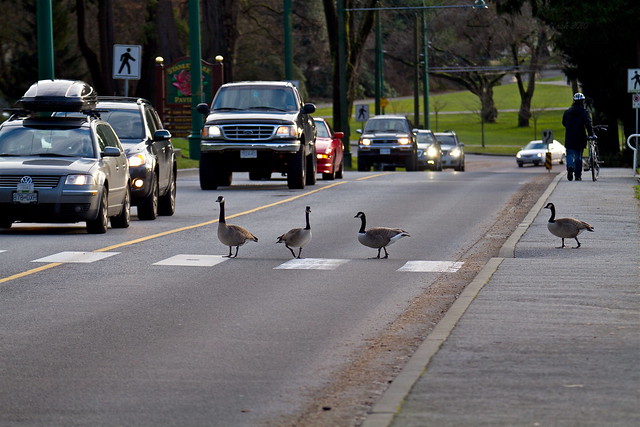Vancouver is the Most Congested City in North America
byVancouver has been ranked the most congested city in North America for the second quarter of 2013 by TomTom’s Traffic Index which compares travel times during non-congested hours with travel times in peak hours. This leap in the charts puts Vancouver (36%) on top of Los Angeles (35%) for the first time.
In Vancouver this means that the average journey time is 36% longer when than when traffic is flowing freely.
Most Congested City in North America
|
1. Vancouver, Canada 2. Los Angeles, USA 3. San Francisco, USA 4. Honolulu, USA 5. Seattle, USA |
6. San Jose, USA 7. Toronto, Canada 8. Washington, USA 9. New York, USA 10. Montreal, Canada |
Last month, News 1130 did a commuter challenge where three people started out from a point in Vancouver – by car, bus, and bike – and tried to reach a common end point during the morning rush. The cyclist arrived first followed by the vehicle and then the transit rider. However this brought up another issue, is cycling a realistic commuting option from the suburbs? News 1130 spoke with Dianne Murray of North Vancouver, who told them her 70-minute cycling trip from Upper Lonsdale to Oak Street and 37th Avenue in Vancouver can be a challenge, but it’s worth the sacrifice.
TomTom estimates that eight work days (64 hours) are lost worldwide to traffic congestion. Canadian cities have a maximum average loss of 11.6 work days (93 hours) based on Vancouver.
A few additional Vancouver facts and figures from the TomTom’s Traffic Index [source: Press Release].
- Delay per year for a commuter with a 30 minute commute: 93 hours (or 11.6 working days)
- Delay per hour driven in peak period: 41 minutes
- Monday continues to be the best traffic days with lowest congestion figures
- Tuesday mornings and Thursday evenings are the worst peak periods of the week
- June 20, 2013 was the most congested day in Q2 for Vancouver
Have you found that your commute has become longer in the last few months? If so, will you be making any changes?




![When The Lights Go Down In The City [Explored]](http://farm8.staticflickr.com/7018/6808204065_39e76a225c_z.jpg)






8 Comments — Comments Are Closed
The powers that be need to make transit a top priority. No one who takes a bus or Skytrain should get to their destination last. We need to create a system that is a reasonable option for those of us who love our cars so much that we choose to spend a few hours eveyday stuck in traffic as opposed to taking transit. In the meantime, why not encourage businesses to stagger their employees hours so we spread the traffic volume out over the day more evenly. A little out-of-the-box thinking perhaps?
Rebecca, your ‘reporting’ seems very car-centric here. Do you know that jobs and population on the downtown peninsula have doubled since the 60s, while car trips have stayed the same? Car-commuters are a privileged relic, a luxury choice not a democratic right. Streetspace must be optimised for broader economic, environmental and social benefit of the city: that means moving *people* not vehicles.
What are the travel time numbers like for peak vs offpeak transit?
What are the travel time numbers like per individual commuter (whatever their commute mode) within CoV vs the average across Metro Vancouver as a whole? (i.e. testing the hypothesis that the awful car-first design of non-CoV munis is suffocating them, while CoV commuters have transit, bike and walking choices).
As JK suggests, transit priority is absolutely key. Not only should the province be stepping up with funding for additional buses, streetcars in surrey and tunneling to UBC, but municipalities should be dedicating full permanent arterial lanes to buses and taxis. The province must absolutely stop funding any new road infrastructure (the Port Mann / Gateway fiscal disaster, followed by Massey Bridge, with absolutely no Return-On-Investment calculations published) and municipalities must ensure their zoning regulations encourage everyone to walk to work, by making that walk as pleasant as a stroll through Kitsilano.
This is a rather absurd study. It measures the difference between well-flowing (non-peak) versus congested (peak) traffic for users of the Tom-Tom system. It does not take into account how many people actually drive or how far they drive.
As an *extreme* example, let’s say 80% of people in LA drive to work and spend an average of 100 minutes on the road at non-peak versus 110 minutes on the road at peak (an increase of 10%). Then let’s say 10% of people in Vancouver drive to work and spend an average of 10 minutes on the road at non-peak versus 15 minutes on the road at peak (an increase of 50%).
In this example, Tom Tom would essentially report that congestion in LA is only 10% (even though far more people spend far more time driving) while the congestion in Vancouver is a shocking 50% (even though far fewer people drive and they spend far less time on the road).
Here’s food for thought, Vancouver is ranked most congested at #1 with Toronto ranked #7. However, according to Statistics Canada: Toronto commuters take 15.5% longer to get to work than Vancouver commuters. Source: http://www12.statcan.gc.ca/nhs-enm/2011/as-sa/99-012-x/99-012-x2011003_1-eng.pdf
What Tom Tom is reporting here is actually how “friendly” a city is to long-distance commuters and to what degree the city would encourage suburban sprawl.
I’d love for Tom Tom to include Mexico in their study next year (since it’s also part of North America). Maybe not enough people are using their app/car nav to get relevant measurements down there. Having lived in Mexico City for 33 years I can attest that 2 to 3 hour commute times (for distances that would normally take 20 to 30 minutes without traffic) are a daily occurrence.
There is a much more balanced assessment on the CBC web page now http://www.cbc.ca/news/canada/british-columbia/is-vancouver-the-most-gridlocked-city-in-north-america-1.2417288
which identifies the problems with Tom Tom’s methodology
Basically Vancouver is more compact than most sprawling North American cities – and our commutes are shorter. Tom Tom fails to take that into account
Wow, have lived in the top 3! LA, however, takes the cake for hours stuck on the freeway.
Face it, Vancouver is a crap hole of expensive overcrowded condos now.
You couldn’t pay me to live there.
Yet I happily did in the 1980s when Vancouver was ‘nicer’.
The quality of living there is has steadily decreased over the years.
Hate to think of how ‘liveable’ Vancouver will be in 20 years.
Ugh.
If you are really interested in why Tom Tom’s measurements of traffic congestion are so controversial I suggest you read http://blogs.reuters.com/felix-salmon/2012/10/17/the-problems-with-measuring-traffic-congestion/
” A congestion index like this one serves two purposes. The first is to compare a city to itself, over time: is congestion getting better, or is it getting worse? The second is to compare cities to each other: is congestion worse in Washington than it is in Boston?
And it turns out that this congestion index, at least, is pretty useless on both fronts. “